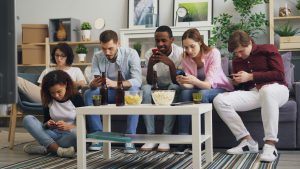The Loneliness Epidemic: Why We Feel Alone Even When Connected
 You have hundreds of online friends. Your calendar is full of events and meetups. You’re constantly messaging, posting, and responding. Yet somehow, that deep sense of being truly seen and known by others remains elusive. How can you feel so alone when you’re never actually by yourself?
You have hundreds of online friends. Your calendar is full of events and meetups. You’re constantly messaging, posting, and responding. Yet somehow, that deep sense of being truly seen and known by others remains elusive. How can you feel so alone when you’re never actually by yourself?
At Televero Health, we’re seeing more and more people struggling with this modern paradox – feeling intensely lonely despite being technically more connected than any generation in human history. They come to us confused about why their many surface connections don’t satisfy their deep need for meaningful relationship. What they discover is that what feels like connection in our digital age often lacks the essential ingredients that make human relationships truly nourishing.
Maybe you’ve felt this disconnect yourself. Maybe you have plenty of people you interact with, but few you could call at 2am in a crisis. Maybe your conversations stay safely in the realm of shared interests, news, or everyday logistics, rarely venturing into vulnerability or depth. Maybe you’ve noticed that the more time you spend on social media, the more isolated you actually feel, despite the apparent connection it provides.
This experience isn’t just in your head. Research increasingly shows that loneliness has reached epidemic proportions in our society, with serious consequences for both mental and physical health. Studies suggest that chronic loneliness is as damaging to physical health as smoking 15 cigarettes a day. It’s associated with higher rates of depression, anxiety, and even conditions like heart disease and dementia.
What makes this epidemic particularly challenging is that it’s not always obvious. Unlike physical isolation, which is clear to observe, emotional loneliness can exist in the midst of busy social schedules and active online lives. It’s not about the quantity of interactions but their quality – the depth, authenticity, and mutual vulnerability that transform social contact into genuine connection.
Several factors in modern life make this kind of authentic connection increasingly rare. Digital communication, while valuable in many ways, often lacks the nonverbal cues, physical presence, and full engagement that deepen human bonds. The pace of contemporary life leaves little room for the unhurried, open-ended conversations where meaningful sharing often emerges. The emphasis on presenting polished, curated versions of ourselves – especially online – creates barriers to the authenticity that true connection requires.
We see the impact of these factors across many different life situations. The person with an active social media presence who feels deeply unseen in their actual experience. The busy professional whose many networking contacts provide career opportunities but not emotional support. The parent who spends their days surrounded by family but has no one with whom they can share their own struggles. The individual who has moved for work and finds that building deep friendships in adulthood is unexpectedly challenging.
If you’re experiencing this kind of loneliness, it’s important to recognize that it’s not a personal failing. It’s a reflection of genuine challenges in how human connection functions in contemporary society. That recognition alone can be healing – understanding that your loneliness isn’t because there’s something wrong with you, but because authentic connection requires conditions that modern life often doesn’t naturally provide.
In therapy, we help people address this disconnection in several ways. First, by identifying what meaningful connection actually means for them specifically – what kinds of relationships and interactions would genuinely meet their needs for being seen, known, and valued. Then, by developing concrete strategies to create more of those authentic connections, often starting with small but significant shifts in how they approach existing relationships and social contexts.
These shifts might include practicing more vulnerable communication with trusted others. Or prioritizing face-to-face interaction over digital connection when possible. Or being more selective about social media use, treating it as a supplement to rather than replacement for direct human contact. Or seeking out communities organized around shared values rather than just shared interests or activities.
What we’ve found is that meaningful connection rarely happens automatically in today’s world. It requires intention, courage, and often a willingness to step outside established patterns of interaction. But the rewards of this effort are profound – not just in alleviating loneliness, but in creating the sense of belonging and being deeply known that is fundamental to human wellbeing.
This doesn’t mean you need to transform all your relationships overnight or abandon digital connection entirely. But it does suggest that if loneliness persists despite being socially active, the solution might not be more social contact, but a different quality of contact. Not more relationships, but deeper ones. Not more communication, but more authentic sharing.
Because the truth is, human beings need more than just social interaction. We need to be truly seen, heard, and known. We need relationships where we can bring our full, imperfect selves rather than just the polished versions we present to the world. We need the particular kind of safety that comes from knowing we matter to specific others, not just in general or abstract ways, but in the concrete reality of their attention, care, and reliable presence.
And while creating these conditions requires effort in today’s world, it also offers a profound opportunity – to reclaim the depth of human connection that technologies and social changes may have altered but have not eliminated as a possibility. To rediscover what it means to be truly present with another person in ways that no digital platform, however advanced, can fully replicate.
Ready to explore how you might create more authentic connection in your life? Start here.
